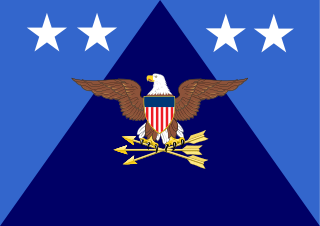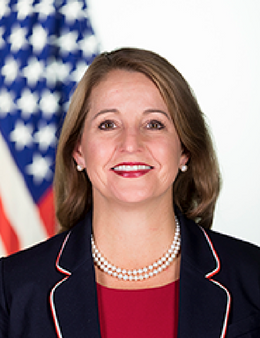Corporate titles or business titles are given to corporate officers to show what duties and responsibilities they have in the organization. Such titles are used by publicly and privately held for-profit corporations, cooperatives, non-profit organizations, educational institutions, partnerships, and sole proprietorships that also confer corporate titles.

The Executive Office of the President of the United States (EOP) comprises the offices and agencies that support the work of the president at the center of the executive branch of the United States federal government. The office consists of several offices and agencies, such as the White House Office, the National Security Council, and the Office of Management and Budget.

The Office of Management and Budget (OMB) is the largest office within the Executive Office of the President of the United States (EOP). OMB's most prominent function is to produce the president's budget, but it also examines agency programs, policies, and procedures to see whether they comply with the president's policies and coordinates inter-agency policy initiatives.
The chief financial officer (CFO) is an officer of a company or organization that is assigned the primary responsibility for making decisions for the company for projects and its finances The CFO thus has ultimate authority over the finance unit and is the chief financial spokesperson for the organization.
In the United States government, independent agencies are agencies that exist outside the federal executive departments and the Executive Office of the President. In a narrower sense, the term refers only to those independent agencies that, while considered part of the executive branch, have regulatory or rulemaking authority and are insulated from presidential control, usually because the president's power to dismiss the agency head or a member is limited.
A comptroller is a management-level position responsible for supervising the quality of accounting and financial reporting of an organization. A financial comptroller is a senior-level executive who acts as the head of accounting, and oversees the preparation of financial reports, such as balance sheets and income statements.
The Chief Financial Officers (CFO) Act of 1990 signed into law by President George H. W. Bush on November 15, 1990, is a United States federal law intended to improve the government's financial management, outlining standards of financial performance and disclosure. Among other measures, the Office of Management and Budget (OMB) was given greater authority over federal financial management. For each of 24 federal departments and agencies, the position of chief financial officer was created. In accordance with the CFO Act, each agency or department vests its financial management functions in its chief financial officer. The following is a list of the 24 affected agencies, which includes all 15 federal executive departments whose heads are included in the Cabinet of the United States, as well as other large agencies:

The Federal Accounting Standards Advisory Board (FASAB) is a United States federal advisory committee whose mission is to improve federal financial reporting through issuing federal financial accounting standards and providing guidance after considering the needs of external and internal users of federal financial information. FASAB is designated as the body that sets U.S. generally accepted accounting principles (GAAP) for the United States Government and its component entities, referred to as federal financial reporting entities. The AICPA Council designated FASAB as the body that establishes GAAP for federal entities in 1999.

Linda Morrison Combs is a former U.S. federal government official. She was the Controller of the Office of Management and Budget in the Executive Office of the President at the White House. She had five Presidential Appointments confirmed by the United States Senate and served under three Presidents: Presidents Ronald Reagan, George H. W. Bush, and George W. Bush.
Executive Schedule is the system of salaries given to the highest-ranked appointed officials in the executive branch of the U.S. government. The president of the United States appoints individuals to these positions, most with the advice and consent of the United States Senate. They include members of the president's Cabinet, several top-ranking officials of each executive department, the directors of some of the more prominent departmental and independent agencies, and several members of the Executive Office of the President.

Linda M. Springer served as the eighth Director of the United States Office of Personnel Management. She was unanimously confirmed by the United States Senate in June 2005. Prior to her appointment, Ms. Springer served as controller and head of the Office of Federal Financial Management at the White House Office of Management and Budget. She previously worked for 25 years as an executive and actuary in the insurance and financial services industries.
A Certified Government Financial Manager (CGFM) is a professional certification issued by the Association of Government Accountants (AGA) in the United States. It was created in 1994 to provide a professional standard of financial expertise and ethics in government and a standard by which government financial management professionals are measured. Its education, experience and ethics requirements have served to elevate the most seasoned financial professionals.

The Under Secretary of Defense (Comptroller)/Chief Financial Officer, abbreviated USD(C)/CFO, is a high level civilian official in the United States Department of Defense. The Under Secretary of Defense (Comptroller) is the principal staff assistant and adviser to both the Secretary of Defense and the Deputy Secretary of Defense for all budgetary and fiscal matters, including the development and execution of the Defense Department's annual budget.
The California Society of Municipal Finance Officers is a professional association of state, county, and local government finance officers in California. The California Society of Municipal Finance Officers is the statewide organization serving all California municipal finance professionals, an affiliate of the nationwide Government Finance Officers Association (GFOA). Membership is open to anyone in the State of California actively engaged in government finance in any city, county, or special district.
The Government Finance Officers Association of Texas is a professional association of state, county, and local government finance officers in Texas. The Government Finance Officers Association of Texas is the statewide organization serving all Texas municipal finance professionals, an affiliate of the nationwide Government Finance Officers Association (GFOA). Membership is open to anyone in the State of Texas actively engaged in government finance in any city, county, or special district. Its stated mission is to enhance the quality of local government finance, to assist and support local government finance professionals in Texas, and to promote the public service profession. GFOAT members are actively involved in the key issues facing cities, counties, and special districts in the State of Texas.

The bill H.R. 3343, long title "To amend the District of Columbia Home Rule Act to clarify the rules regarding the determination of the compensation of the Chief Financial Officer of the District of Columbia," is a bill that would change the amount of legal compensation the chief financial officer of Washington, D.C. could receive each year. Under this bill, the CFO compensation could equal the same compensation received by a senior executive service federal official. The bill was introduced in the United States House of Representatives during the 113th United States Congress. It passed the House on November 18, 2013.

The Omnibus Territories Act of 2013 is a bill that amend laws concerning the territories of American Samoa, Guam, the U.S. Virgin Islands, and the Commonwealth of the Northern Mariana Islands. The bill would increase the size of the territory of the Northern Mariana Islands, start an energy plan for the areas, and expand turtle conservation efforts.

The Assistant Secretary of the Treasury for Management, Chief Financial Officer, and Chief Performance Officer (ASM/CFO/CPO) is the principal policy advisor to the Secretary and Deputy Secretary on the development and execution of the budget for the Department of the Treasury and the internal management of the Department and its bureaus. The ASM/CFO/CPO also oversees Department-wide management programs including human resources, information and technology management, financial management and accounting, strategic planning, performance budgeting/metrics, acquisition/procurement, training, human capital and workforce management, equal employment opportunity (EEO), environmental health and safety, emergency preparedness, small business programs, and administrative services for Treasury's headquarters, the Departmental Offices.

Suzette Kuhlow Kent is an American government official who served as Federal Chief Information Officer of the United States from January 29, 2018 until July 2020. She was the fourth person to formally hold the job of Federal CIO, which was created by the E-Government Act of 2002. The Federal CIO's office is a part of the Office of Management and Budget (OMB).










